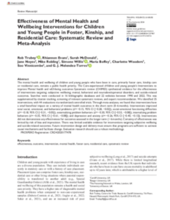The mental health and wellbeing of children and young people who have been in care, primarily foster care, kinship care or residential care, remains a public health priority. The Care-experienced cHildren and young people’s Interventions to improve Mental health and wEll-being outcomes Systematic review (CHIMES) synthesized evidence for the effectiveness of interventions targeting: subjective wellbeing; mental, behavioral and neurodevelopmental disorders; and suicide-related outcomes. Searches were conducted in 16 bibliographic databases and 22 websites between 1990 and 2022. This was supplemented by citation tracking, screening of relevant systematic reviews, and expert recommendation.
The authors identified 35 interventions, with 44 evaluations via randomized controlled trials. Through meta-analyses, we found that interventions have a small beneficial impact on a variety of mental health outcomes in the short term (0–6months). Interventions improved total social, emotional, and behavioral problems (d=−0.15, 95% CI [−0.28, −0.02]), social-emotional functioning difficulties (d=−0.18, 95% CI [−0.31, −0.05]), externalizing problem behaviors (d=−0.30, 95% CI [−0.53, −0.08]), internalizing problem behaviors (d=−0.35, 95% CI [−0.61, −0.08]); and depression and anxiety (d=−0.26, 95% CI [−0.40, −0.13]).
Interventions did not demonstrate any effectiveness for outcomes assessed in the longer term (>6months). Certainty of effectiveness was limited by risk of bias and imprecision. There was limited available evidence for interventions targeting subjective wellbeing and suicide-related outcomes. Future intervention design and delivery must ensure that programs are sufficient to activate causal mechanisms and facilitate change. Evaluation research should use a robust methodology.

